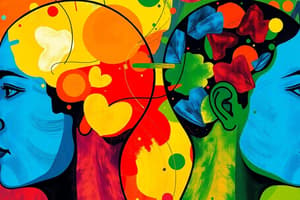Podcast
Questions and Answers
Which statement accurately defines intelligence in the context of differential psychology?
Which statement accurately defines intelligence in the context of differential psychology?
- Intelligence is defined exclusively as the capacity for mathematical reasoning.
- Intelligence is solely determined by genetic factors inherited from parents.
- Intelligence mainly refers to the speed of information processing in the brain.
- Intelligence encompasses the ability to learn from the environment and adapt to new situations. (correct)
What distinguishes trait theory in personality psychology?
What distinguishes trait theory in personality psychology?
- Traits are focused solely on cognitive abilities and ignore emotional dimensions.
- Traits are stable characteristics that predispose behavior across different situations. (correct)
- Traits are defined as situational behaviors that vary based on context.
- Traits are temporary and can change significantly over time.
Which of the following accurately describes developmental differences?
Which of the following accurately describes developmental differences?
- Developmental differences are limited to personality traits without considering ability.
- Developmental differences are primarily attributed to genetic inheritance.
- Developmental differences only refer to physical changes in height and weight.
- Developmental differences encompass changes over time, such as aging and pubertal timing. (correct)
What is the main focus of experimental psychology within the framework of differential psychology?
What is the main focus of experimental psychology within the framework of differential psychology?
How do surprising differences contribute to understanding individual differences?
How do surprising differences contribute to understanding individual differences?
Flashcards
Intelligence
Intelligence
The ability to understand complex ideas, solve problems, and adapt to new situations by learning.
Personality
Personality
Enduring traits influencing behavior and emotions.
Trait
Trait
A stable characteristic predicting consistent behavior.
Experimental Psych
Experimental Psych
Signup and view all the flashcards
Correlational Psych
Correlational Psych
Signup and view all the flashcards
Study Notes
Key Concepts of Differential Psychology
- Intelligence: The capacity to comprehend complex ideas, solve problems, and adapt by learning from the environment.
- Personality: A collection of stable characteristics impacting behavior and emotions, organized in a hierarchy.
- Trait: A consistent characteristic influencing how a person behaves in various situations.
- Identity: A person's sense of self; reputation how others perceive and judge them.
Differences Between Individuals
- Physical Differences: Variations in height, weight, body type, and hair.
- Physiological Differences: Variations in blood pressure, hormones, metabolism, and internal functions.
- Surprising Differences: Unique traits like organ placement, bone/finger variations.
- Developmental Differences: Changes across the lifespan, affecting personality and abilities (e.g., puberty timing, aging).
Cronbach (1957) – Two Disciplines of Scientific Psychology
- Experimental Psychology: Focuses on manipulating variables to study cause-and-effect relationships in behavior under different conditions.
- Correlational Psychology: Studies links between genetic, developmental, and environmental factors to understand individual differences in personality and intelligence.
Studying That Suits You
Use AI to generate personalized quizzes and flashcards to suit your learning preferences.




